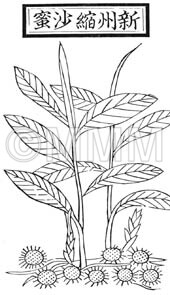Crude drug sample data base
※Click on the image to enlarge it.
The capital city, provincial capital city or the representative
location of its administrative area is indicated.
location of its administrative area is indicated.
Production area information
Socialist Republic of Viet Nam
https://ethmed.toyama-wakan.net/img/pin_san.png
34.6937378
135.50216509999996
Collection information
Japan,Osaka Pref.
https://ethmed.toyama-wakan.net/img/pin_nyu.png
Scientific information data base
| Common name | 縮砂, Suosha, Amomi Semen (JP18), Amomi Fructus (CP2020), Amomum Seed (JP18), Villous Amomum Fruit (CP2020) | |||||
|---|---|---|---|---|---|---|
| Synonyms | 縮砂仁, 砂仁 | |||||
| crude drug image |
| |||||
| Original plant name | Amomum villosum Loureiro var. xanthioides T. L. Wu et S. J. Chen, Amomum villosum Loureiro var. villosum or Amomum longiligulare T. L. Wu. | |||||
| original plant image |
| |||||
| Family name | Zingiberaceae | |||||
| Used part | seed mass or mature fruit | |||||
| Quality for selection | Good Suosha is a large oval sphere. Without exciple, the exterior is dark brown. There are products coated with white powder. (TN) | |||||
| Official compendium | JP XVIII, CP (2020 ed.) | |||||
| Clinical application | As an aromatic stomachic and antiflatulent, Yangchunsha is applied for weakness of digestive system, gastric stagnation, dyspeptic and nervous diarrhea. | |||||
| Medical system | Traditional Chinese medicine | |||||
| Drug effect in traditional medicine | Traditional classification | Aromatic drugs for resolving dampness | ||||
| Beneficial effect | [Property and Flavor] Warm; pungent. [Meridian Tropism] Spleen, stomach and kidney meridians. [Actions] To resolve dampness to increase the appetite, warm the spleen to check diarrhea, regulate qi to prevent miscarriage. [Indications] Dampness-turbidity obstruction in the middle, epigastric stuffiness, spleen-stomach deficiency cold, vomiting, diarrhea, morning sickness, threatened abortion. | |||||
| Chemical constituent | Monoterpenoids Amomum xanthioides: Essential oil1.5~3% (*C1): d-Borneol, Bornyl acetate, Linalool, d-Camphor, Nerolidol Alpinia japonica: Essential oil1 0.4~0.8% (*C1): Cineole, beta-Pinine Sesquiterpenoids A. japonica (*C1): Sesquiterpene, Sesquiterpene alcohol Flavones & Flavonols A. japonica (*C1): Izalpinin, Alpinone, nor-Alpinone-3,5-dimethyl ester | |||||
| Chemical structure |
※画像をクリックすると、拡大して表示されます。 | |||||
| Pharmacological effect | Aromatic stomachic (essential oil). | |||||
| Classical reference (Chinese Herbal Classic "Zhenglei bencao") |  ※Click this image to see the actual image ※Click this image to see the actual image | |||||
| Disease | Full stomach, Abdominal pain, Nausea, Vomitting, Anorexia, Hyperemesis gravidarum, Diarrhea, Muddy and watery stool, Threatened abortion, Threatened abortion | |||||
| Formulation | Anchusan, Kyoseihatekigan, Koshaheiisan, Kosharikkunshito, Jinryobyakujutsusan, Bunshoto, Chokoshiteito, Ireito, Zenshikunshito, Dosuibukuryoto, Shobaito, Kagen'ireito, Kagenshosaikoto, Shiinsen, Jippito, Junkiwachuto, Junhaito, Shobaito, Shohito, Jinkokokito, Sogento, Jiohanho, Chokobukuryoto, Rokuutsuto, Koshayoito | |||||
| Related drugs | Yangchunsha (陽春砂) and Izusyukusya (伊豆縮砂, Japan) | |||||
| References | JP18: The 18th edition of the Japanese Pharmacopoeia. CP2020: Pharmacopoeia of the People's Republic of China 2020 edi. C1) The Encyclopedia of Wakan-Yaku with Color Pictures Vol. I, pp 242-244. | |||||
| Remarks | The Pharmacopoeia of the People's Republic of China defines the mature fruit of Amomum villosum Lour.(陽春砂, Yangchunsha), A. villosum Lour. var. xanthioides T.L. Wu et Senjen (= A. xanthioides Wall.) or A. longiligulare T.L. Wu as Sharen (縮砂). Amomum Seed, in the Japanese Pharmacepoeia, had been defined the seed mass of Amomum xanthioides Wallich until its 16th edi. In the 17th edi., it is specified as the seed mas of Amomum villosum Lour. var. xanthioides T. L. Wu et S. J. Chen, Amomum villosum Lour. var. villosum or Amomum longiligulare T. L. Wu. Izusyukusya (produced in Japan): There are two kinds of Suosha, Kokushu and Hakushu. The former is the seed, without aril, of Alpinia japonica (Thunb. ex Murray) Miq. (Jap. name: Hanamyōga) or A. intermedia Gagnep. (Jap. name: Aonokumatakeran). The latter is the arillate seed of A. speciosa (J.C. Wendl.) K. Schum. (Jap. name: Gettō), and the quality is not good. Sharen produced in Taiwan is regarded as the seed of Gettō. | |||||
| Last renewal date | 2022/10/05 | |||||












